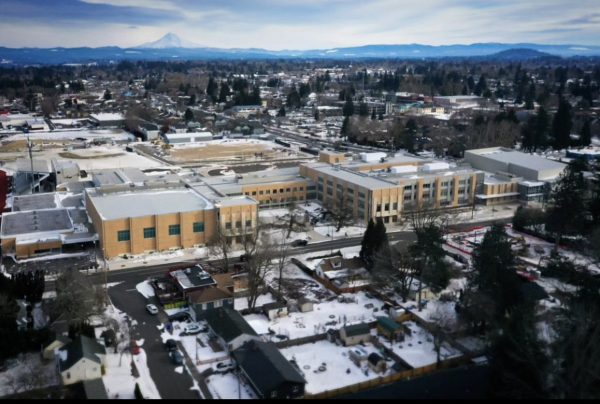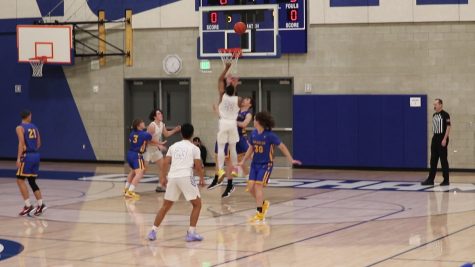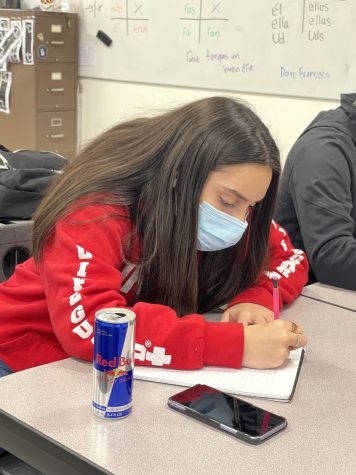2022 school year approaches, with the full transition to AP
June 8, 2022
Gresham High School is finally making the transition from the IB to AP program as the 2021-2022 school year comes to a close. The programs differ in several ways, and it leads us to wonder how this change will affect students taking advanced classes.
The elimination of the IB program, or International Baccalaureate program, was first announced by the district in January of 2020, just before the pandemic hit. According to a presentation given to the staff, “The racial demographics of those pursuing the full IB Diploma do not match those of GHS as a whole.”
The district also cited low participation in IB classes, saying the number of students “currently pursuing the full IB Diploma is the lowest it has been since the inception of the program.”
Having been available at GHS for 20 years prior to the announcement, teachers and students became accustomed to IB-specific pace and structure.
“It just has a lot more components that students have to learn through their IB courses. It’s more hands-on in art, focus, and verbal,” former IB Language and Literature teacher and current AP Language and Composition teacher Safiyah Thorne said. “They (IB) have the oral exam, they have the written exam, and they have the presentation. They have different IB courses that you have to take to obtain an IB Diploma that’s already tracked out.”
AP, on the other hand, consists of more “skills based development,” and is US based as opposed to IB being international. It could also be described as being more structured overall by educators, “giving students a chance to tackle college-level work while they’re still in high school,” according to the CollegeBoard website.
“There are rubrics that are designed, there are units that are created for each of the [multiple] content areas. It’s just very straightforward,” Thorne said. “There’s not any AP lesson that says, this is how you teach, this is what you should do. It gives you the topics, the framing, the units. But then it leaves it up to the teachers to fill in articles, stories, and practice exams.”
Some teachers have had to split their classes between IB and AP curriculum because of the shift, including long-term substitute teacher Andrew La-Due Pellico, who stepped in to teach IB/AP Psychology this fall.
“Balancing the workload between the IB, AP, and the elective students was difficult,” La-Due Pellico said. “Also, trying to think of ways to cover different assignments and different units was a problem, and also the fact that some of the vocabulary isn’t even the same.”
Although teaching advanced classes has its challenges, some teachers have left an impression on students through diligent teaching and empathy towards students, such as former IB US History teacher and current AP US History teacher Amanda Williams.
“As a student, I get the sense that she really cares about the subject, and about educating us on it in a comprehensive way,” senior Finn Thornton said.
There are also different approaches within both programs with a different emphasis overall.
“AP is much more content oriented, but IB is much more [focused on] general skills, college skills, and so they have their advantages,” LaDue Pellico said. “I think that the IB system prepares you more for college generally, but the AP one prepares you more for whatever your subject is that you’re studying. It’s more specialized.”
There are several benefits to taking advanced classes like IB and AP, aside from the possibility of earning college credit and the classes themselves being a feather in your cap on your transcript.
“It gives you more structure, and that higher standard. It’s pushing yourself to a standard that’s above what you’ve been given,” Thorne said. “It also gives you a chance [to think]: Do I want to go to college? Will this actually benefit me? You have enough knowledge and skill and experience now, but what if after all that coursework, you found that maybe hands-on trades programs or certification programs were a lot better for you?”
Despite those benefits, the coursework is a prevalent factor in any advanced class, and a heavy workload is a concern for students.
“[IB classes have] prepared me for college and given me college credit. However my time has not benefited, because it is very sparse due to the workload,” senior Judah Gerards said.
Unfortunately, it’s unlikely that the workload for students will lessen in AP classes, but the coursework may have a different focus.
“As far as the workload, I think that they are very similar,” La-Due Pellico said. “I think AP is much more concerned with vocabulary, and IB is much more concerned with writing. Also, there’s that massive IA experiment that you run.”
Overall, it’s advised that students try at least one advanced course during their high school career, to give them a chance to be in a college-paced environment with its rigorous coursework, and to see whether college would be beneficial to them. IB brought this opportunity to students, along with the chance for college credit. AP, although similar, could bring the same, as well as other opportunities to students through its intense, yet different curriculum.







